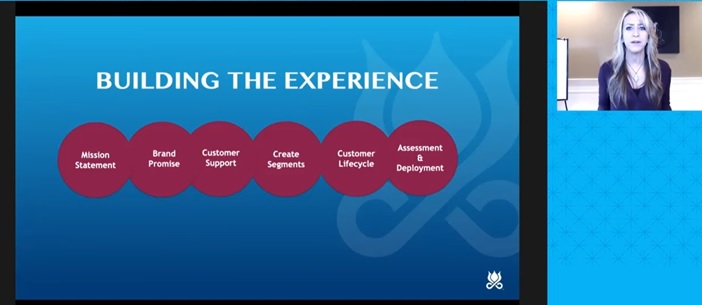Articles
From Cost to Service Center: Becoming a Cherished Advisor
- By Bryan Lapidus, FP&A
- Published: 10/28/2020

The business is hungry for finance expertise that is insightful, timely and well presented. Are we ready to provide it? Amy Vetter, the AFP 2020 FP&A keynote speaker and one of the most influential people in accounting and finance, outlined how to prepare ourselves and our department to deliver it.
ADOPTING A CUSTOMER SERVICE MINDSET
Vetter began her AFP 2020 presentation with a tragic, personal story of when a financial partnership was not available. Vetter’s mother owned several successful cleaning businesses in the 1980s, but as the early stages of the savings and loan crisis hit, the business accountant could not report on the rise of uncollected payables or advise to increase cash reserves on a timely basis. The information lagged operations and information was reported as cold financials rather than intelligence to act upon. The effect was devasting.
The accountant was trusted and competent but did not rise to the level of a “cherished advisor that the business could not live without.” It is this level that Vetter challenged to audience to achieve. Making the transition from being a cost center that capably handles the finances to a service center that supports the business requires rethinking how we perceive our organization, developing a plan to reach out, and supporting that with soft skills that complement our technical capabilities.
Adopting a customer service mentality requires that we design the customer experience of what our partners can expect when they interact with your department and requires several elements:
- Mission statement: Define your “why” and how do you serve that by making sure you do that the majority of your time.
- Brand promise: When people work with your department, what value will they receive?
- Customer support: What technology will support them and your team so that time wasters fall away and you can be a better advisor? Is it bots? Is it a report, or frequently asked questions that automate easy requests without human touch? Automation is the key to free up time from the rote in order to focus on the relationship, where we as people add value.
- Create segments: Are you structured in a way to support your partners?
- Customer lifecycle. What is the service process? Are their expectations met? Where can we “wow” them?
- Assessment and deployment: Assume continuous improvement. “We will never set things in stone for years and walk away,” Vetter said. “We are an agile work environment where we constantly reassess our human and technology interactions.” Are we meeting our mission? Are we duplicating work? Can we do it 10% or 20% better?

BUILDING THE EXPERIENCE
Next, Vetter says we need to put the elements in place to announce and deliver the customer experience that you have designed. The key phases are as follows:
- Awareness: Change the messaging about your department and let people know what you will do for them. Reach out to let people know you want to help, and show testimonials of how you have helped through presentations, office newsletters and conversations.
- Discovery: Don’t feel a need to answer questions on the spot, especially while you are learning about your customers. Ask questions, take information, come back and communicate that you heard and understood.
- Relationships: Vetter advises us to walk into a conversation as if it is the first time talking to that person in order to be fully present and observational. Otherwise, we risk overlooking the most important information. Specifically, we can:
- Turn the webcam turned on to read the body language and stop us from multitasking
- Ensure meetings add value and are not perfunctory, compulsory exercises to just deliver numbers
- Visualize information in a consumable way for non-finance people that tells them what they need to know
- Deliver presentations in the format of a three-act play: background, conflict, resolution.
The Certified Corporate FP&A Professional identifies you as that trusted advisor CFOs are looking for. The early deadline for the upcoming exam window is November 13. Apply here.
DEVELOPING SOFT SKILLS
Building relationships and delivering services requires that we move beyond our technical capabilities and develop the soft skills that lead to influence. Vetter lays out six critical skills to accomplish this and encourages training specific to these areas:
- Be responsive: Deliver on the requests. Vetter noted that this “does not mean we need answer that minute, but we do need to communicate when we will answer” in order to show care for the partner without being overwhelmed ourselves.
- Collaborate: Show mutual respect of the expertise of others. Our partners may not understand our numbers, and we don’t want them to reject our words out of fear of turning us off. We need to demonstrate that our analysis serves their goals.
- Influence: Help stakeholders and teammates to make a decision and feel like they benefitted from the interaction with you. Influence is not restricted by the level of seniority.
- Problem solving: Vetter advises that we assess a problem, pause to ask the questions we need to ask, take in the information, and return with a well-thought-out solution. “It is okay to not know the answer right away,” she explained. “The other person is not asking for an answer right away. That is a stressor we often put on ourselves.”
- Show leadership: Provide confidence that you have the experience and capabilities to help the team achieve their goals.
- Exhibit project management: The ability to pace work and deliver value demonstrates competence, control and caring.
It is hard to find all of these traits in a single person, and harder to find them naturally. Vetter has ideas on this as well. First, consider a team approach that allows a finance department to deliver expertise in each area. Second, “Education does not always mean technical,” and “CPE is not enough.” We need to train ourselves on all skills to become a cherished advisor. Our stakeholders need that from us.
For more insights, listen to Amy Vetter’s full keynote presentation. The FP&A Keynote was sponsored by CCH Tagetik, Planful and Vena.
Copyright © 2024 Association for Financial Professionals, Inc.
All rights reserved.

